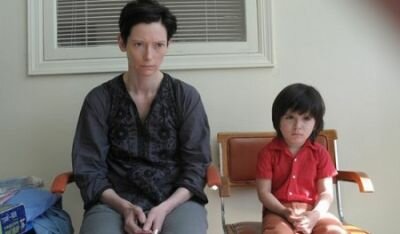
|
| |
| |
|
|
| |
|
|
| |
We Need To Talk About Kevin
(15)
© Unknown - all rights reserved
|
| |
|
|
| |
 |
| Tookey's Rating |
|
|
4 /10
|
| |
| Average Rating |
|
|
7.30 /10
|
| |
| Starring |
Tilda Swinton  , John C. Reilly, Ezra Miller , John C. Reilly, Ezra Miller |
| Full Cast > |
|
|
|
| |
Directed by: Lynne Ramsay 
Written by: Lynne Ramsay, Rory Kinnear  , based on Lionel Shriver’s novel , based on Lionel Shriver’s novel
|
|
| |
|
|
| Tookey's Review |
|
| Pro Reviews |
|
| Mixed Reviews |
|
| Anti Reviews |
|
| Cast |
|
| |
 |
| |
| Released: |
2011 |
| |
|
| Genre: |
DRAMA
HORROR
OVERRATED
THRILLER
|
| |
|
| Origin: |
UK/ US |
| |
|
| Colour: |
C |
| |
|
| Length: |
112 |
|
| |
|
| |
|
|
| |
|
|
But it’s all about Eva.
|
Reviewed by Chris Tookey
|
We Need To Talk About Kevin is an ultra-solemn attempt to graft the style of an expressionist art-house film on to the sensational content of a horror movie.
As readers of Lionel Shriver’s best-seller will know, it’s the story of former travel writer Eva (Tilda Swinton, pictured left) living alone in an American small-town community that has made her a pariah. Once, she was married to a pleasant and prosperous husband (John C. Reilly) and gave birth to two children.
From the outset, Kevin – the older of the two - is the baby from hell. He won’t stop screaming. Then he’s a dead-eyed 6-to-8 year-old (Jasper Newell, pictured right) who can’t be potty-trained, won’t play and regards Eva with sullen resentment that leads her to harm him physically.
In his teens, Kevin (now played by a better young actor, Ezra Miller) commits a series of vicious acts, culminating in one so heinous that, right from the start of the movie, we see other people regard his mother with unconcealed hatred.
The best thing about the film is Tilda Swinton, who gives a cleverly nuanced performance that reveals the vulnerability behind Eva’s cold, gaunt exterior. It would be no surprise if she were nominated for an Academy Award.
Scottish director Lynne Ramsay brings the same leisurely pace, remorseless intensity and obsession with colour that marked her first two films, Ratcatcher and Morvern Callar.
But in ditching the novel’s structure – which took the form of Eva’s letters to her absent husband after the climactic event – Ramsey sacrifices the shock value of the twist at the end of the book
Most fatally for the film’s chances of attracting an audience, the cinema exposes faults in the original novel that a reader could easily overlook.
There is a huge element of unbelievability to Kevin’s character and development. His father and mother don’t need to talk about this blatant sociopath; they need to get him professional help, and that idea never seems to occur to them.
Though Eva does make an initial inquiry about possible autism, it is incredible that his behavioural problems don’t involve him seeing at least one child psychiatrist. It’s amazing that his teachers don’t view him with concern. And his climactic act makes no sense without some previous record of violence or bullying by his peers.
Nor is there the slightest explanation for Kevin’s extraordinarily evil personality. He is easily the most fascinating presence in the movie, but the film-makers are interested in him only insofar as he affects his mother.
This turns it into a hard-line feminist parable. Ms Shriver poses the question: what are successful career-women to do when they give birth to the kind of insensitive, stroppy, aggressive male that they have loathed since their own childhood?
It is a query that will strike most people, mothers of boys especially, as more than faintly ridiculous. Kevin is a fantastical creation who bears little or no relation to the vast majority of real boys. It is no surprise that Ms Shriver herself is childless.
You have only to compare this with other “bad seed” films, such as Rosemary’s Baby, The Omen and Orphan, to appreciate the movie’s shortcomings as regards pace, storytelling and ability to suspend the audience’s disbelief.
This is cheap grand guignol posing as a valuable insight into the male psyche.
But I wouldn’t mind betting that Tilda Swinton will be in contention at next year’s award ceremonies. Hers is an acting tour de force.
It’s the story around her that doesn’t convince.
|
|
|
|
|
|
